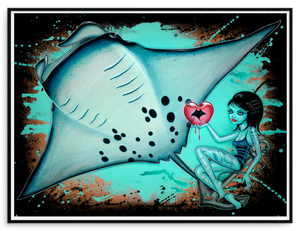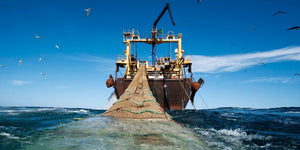
May Mantas Thrive
Shipping calculated at checkout
In stock
All Sales Final
Please review our Refund Policy before checkout. All sales are final for our limited-edition prints, which help support PangeaSeed’s conservation work.
Print Details
May Mantas Thrive by Caia Koopman released in celebration of World Oceans Day 2015
Limited Edition of 50 (signed & numbered)
Fine art Giclée print on Italian cold-press archival watercolor paper
24" x 18"
Printed by Paragon Press
Artist Statement
'Every time I learn more about an animal I share this planet with I fall in love with them a little more. This just happened with the Manta Ray, Mantas are so awesome, gentle, intelligent, curious, playful, not to mention HUGE! I think a dive with Mantas is officially on my bucket list, this sounds like an amazing adventure to swim with such majestic creatures in their ocean home. Sadly every time I learn more about a new animal I also become so frustrated with the way humans bulldoze their way through fragile habitat, wreak havoc on our oceans and marine life, and how we brutally butcher our fellow creatures for exotic cuisine and magical cures.
I’m so happy to be able to paint my May Mantas Thrive painting to raise awareness about the realities Mantas face, it’s hard to be a gentle giant these days. The plight of Mantas right now reminds me so much of the plight of elephants, both awesome, intelligent, curious, playful and simply wonderful animals, both butchered for having one stupid thing people desire. Elephants are in danger of going extinct in the wild in possibly just a few years if something isn’t done to stop the butchering, let’s not let Mantas go down this same brutal road. If I were a bazillionaire I would build an army of environmental warriors to fight side by side my army of environmental lawyers!'
About World Oceans Day
In 2009, the United Nations General Assembly declared June 8 of each year "World Oceans Day". Similar to "Earth Day", World Oceans Day is a global day of events and activities such as beach clean ups, educational programs, art contests, and film festivals all helping to celebrate our seas and raise greatly needed awareness of pressing ocean environmental issues such as overfishing, plastics waste, pollution, coastal development, habitat loss, climate change and ocean acidification.
About Manta Rays
Manta rays are some of the most fascinating creatures that live in our oceans. With the largest brain of all fish, their intelligence and curiosity make interactions with these animals an amazing experience. The magnificent and gentle manta rays, cousins of the shark, are filter feeders (meaning they only eat plankton and small krill) and are the largest rays in the oceans. Several aspects of the lives of mantas remain a mystery with little of their ecology understood. Of great concern, human consumption for these animals has developed in recent years, with devastating effects on manta populations worldwide.
Demand for the gills of manta and mobula rays has risen dramatically in the past 10 years for use in traditional Chinese medicine although historically they were not used for this purpose. None of these purported medical claims are supported by science nor are they supported by traditional Chinese medicine texts. Researchers found that the gill raker trade is conducted by the same networks responsible for the devastating trade in shark fins, which have turned to rays for additional profits as worldwide shark populations decline. Manta rays are so popular within the scuba diving industry that a single animal can generate more than US$ 1 million for tourism over its lifespan, according to a new report issued by the Manta Ray of Hope project.
You can help save Manta Rays
- Donate to organization working to raise awareness and research such as PangeaSeed.
- Advocate global and regional action to protect manta and mobula rays.
- Recommend ecotourism and dive with manta rays. This offers sustainable monetary alternatives to fishing.
- Think twice before you buy. Do not consume manta or mobula ray parts such as Peng Yu Sai.
- Educate yourself, friend and family on the issues facing manta rays and other endangered ocean animals. Act NOW if we wish to save our seas.
Also Available by Caia Koopman

The Story Behind
May Mantas Thrive
Caia Koopman

About the Artist
Caia Koopman






